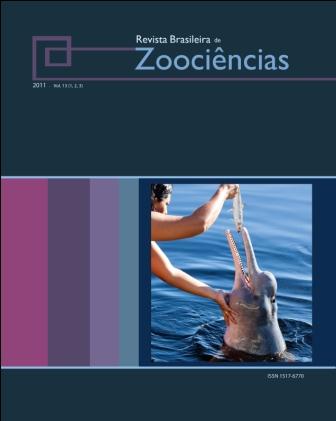Aspectos da biologia reprodutiva do Bacurau Nyctidromus albicollis (Gmelin, 1789) (Aves, Caprimulgidae) em Seropédica, Rio de Janeiro, Brasil
Resumo
Abstract. Aspects of the reproductive biology of Nyctidromus albicolis (Gmelin, 1789) (Aves, Caprimulgidae) at Seropedica, Rio de Janeiro, Brazil. We studied three nests of Nyctidromus albicollis in the years of 2002, 2003 and 2005, in the Campus of the Agricultural Federal University of Rio de Janeiro, Seropédica, Rio de Janeiro, Southeastern Brazil. The incubation period lasted 19 days. The female was observed incubating the eggs in 67.1% of the daylight observations, whereas the male played this function in 32.9% of the daylight observations. During the night period, 55.3% of the incubation was carried by the female and the remain by the male. Nests were located in small depressions on the ground, measuring between 76 and 82mm of diameter and 9 and 10mm of depth. Hatching occurred on 5, 7 and 8 September and the young are weighed in average 4.5g. After the hatching, was observed a greater participation of the male in the care of the nestlings, which was responsible for 58.7% of the day time and 57.8% of the night time, while the female was responsible for 41.3% and 42.2%, respectively. The period of development of the youngs lasted from 21 to 24 days. When become independent the average weight of the birds (44.5g) it corresponded a daily increment of 1.67g/day.



